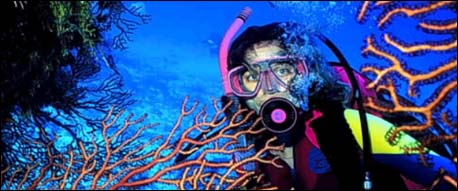
Hotels
SPONSORED
LINKS
Scuba
Scuba stands for self-contained underwater breathing apparatus. Scuba divers carry a tank of air that allows them to breathe while deep underwater.
Scuba Diving
 The act of entering water and remaining below the surface to explore, to work, or simply to have fun. It is usually done in the ocean, but divers also explore other bodies of water, including lakes, rivers, and ponds.
The act of entering water and remaining below the surface to explore, to work, or simply to have fun. It is usually done in the ocean, but divers also explore other bodies of water, including lakes, rivers, and ponds.
There are many different types of diving, of which cave, wreck, tek, commercial and military diving are just a few. The most common form of diving is Leisure diving, or recreational diving.
Recreational divers do so to enjoy aquatic life, but others carry out serious-work underwater. Commercial divers are highly trained men and women who work on offshore oil rigs, pipelines, harbours and wrecks.
In addition to commercial operations, Police divers perform search-and-recovery missions. Military divers engaged in combat and surveillance. Treasure hunters and salvagers recover valuables by diving in areas where ships lie on the bottom. Marine biologists, geologists, and archaeologists use diving to gather valuable scientific information.
The Professional Association of Dive Instructors (PADI) estimates that there are now 6 million active divers worldwide.
Leisure Diving
It is something that has to be experienced for oneself. Passionate about the underwater world and the sense of liberty it brings, leisure diving allows the freedom to explore a beautiful landscape or its flora. Whether on your own or in a group, leisure diving will seduce and empassion you. Leisure diving is practiced at depths of less than 130 ft (39 m). From these depths, divers can make a straight ascent to the surface. Diving beyond this limit requires advanced training. about the underwater world and the sense of liberty it brings, leisure diving allows the freedom to explore a beautiful landscape or its flora. Whether on your own or in a group, leisure diving will seduce and empassion you. Leisure diving is practiced at depths of less than 130 ft (39 m). From these depths, divers can make a straight ascent to the surface. Diving beyond this limit requires advanced training.
Muck diving
Muck sites are habitats where many interesting and even bizarre marine creature can be found, animals such Sea horse, Anglerfish, Mandarin fish, Flamboyant cuttlefish, the stunning Venus comb murex, frogfish, ghost pipe fish, cow fish, strange crab, amazing scorpion fish, mantis shrimp, Snake eel, Crocodile fish, Wobbegong and marvellous nudibranch can be seen. New species, which have yet to be scientifically described and named, are being found regularly.
Wreck diving
Every one of the wonderful wrecks that lie dormant on the sea-bed has their own story to tell. They are the last witnesses and remains of human tragedy and adventure. They have brought with them their own secrets, sometimes they are guarded secretly, other times they are unveiled to visiting divers. These wrecks have become artificial reefs that over the course of time have become home to an abundant marine flora and fauna, startling in their diversity. Divers can take special wreck-diving courses to learn how to explore a shipwreck safely. Going inside a shipwreck without proper training can be extremely dangerous, because divers can get lost and not find their way out.
Cave Diving
Cave diving offers an opportunity to explore the geological wonders of underwater caves. It is far more dangerous than diving in open water because, once inside a cave, the diver cannot return directly to the surface for air. Cave divers use multiple tanks, backup systems, and other specialized equipment (including lights) to travel safely in the complete darkness of caves. They also carry a reel of strong, lightweight line, which they attach to a solid object outside the cave. A diver who becomes lost can retrace his or her path by following the line to the mouth of the cave.
VIEW SCUBA GUIDE

|